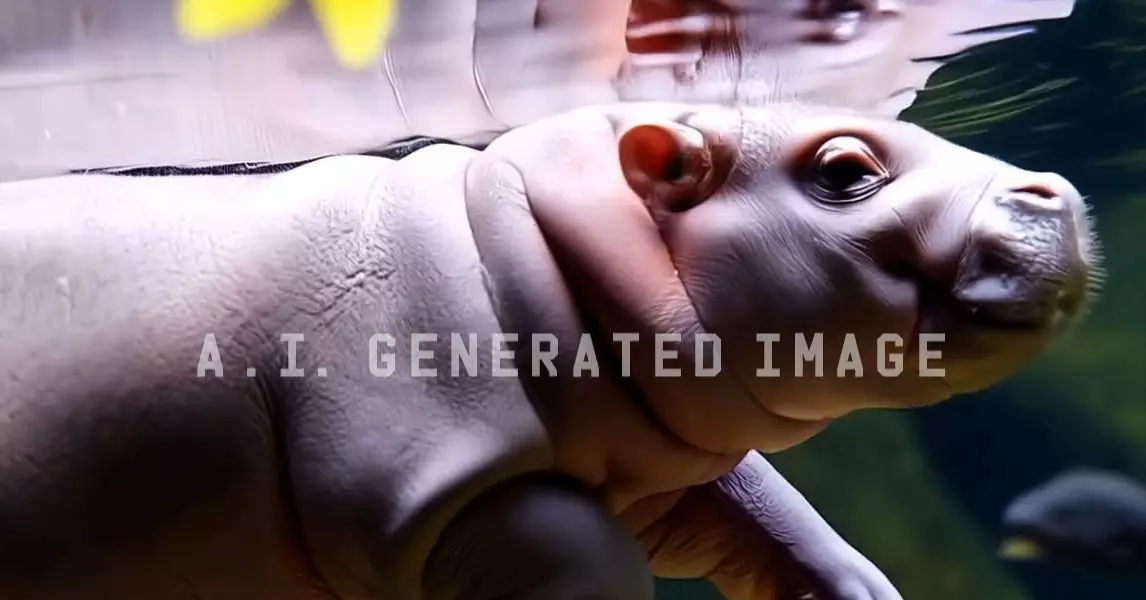In a bold move within the realm of artificial intelligence, Meta unveiled its latest creation, Movie Gen—a groundbreaking model designed to produce realistic video and audio clips tailored specifically for media generation. Following the trends set by its competitors, Meta aims not only to generate basic audiovisual content but also to morph existing footage, presenting a notable step forward in the capabilities of AI-generated media. Among the entertaining demonstrations shared during the announcement are eye-catching examples such as a baby hippo leisurely swimming, showcasing the model’s potential for generating vivid and lively scenes.
Unlike traditional methods that require extensive manual editing, Movie Gen allows for highly targeted modifications to existing video footage. This functionality aligns with the evolving demands of content creation, where flexibility and creativity play an essential role. For instance, in one showcased clip, a woman donning a VR headset was ingeniously altered to appear as if she were sporting steampunk binoculars. Such features enhance storytelling possibilities, providing filmmakers and creators with the tools required to bring their visions to life more seamlessly than ever before.
Moreover, the inclusion of AI-generated audio complements the visual elements effectively. Clips featuring the soothing sounds of nature, the roar of a sports car, and suspenseful musical cues enhance the overall viewing experience, positioning Movie Gen as a highly interactive media tool. Such an intricate pairing of visual and auditory content fosters a more immersive environment, vastly improving how viewers engage with the material.
Meta’s Movie Gen boasts remarkable technical specifications, comprising 30 billion parameters for video generation and 13 billion for audio. This impressive capability size hints at the model’s potential to perform effectively in creating high-definition videos lasting up to 16 seconds. Particularly noteworthy is Meta’s assertion that Movie Gen outpaces competitive models when it comes to video quality—an area crucial for content creators in a landscape saturated with digital media.
When compared to other language models, such as Meta’s Llama 3.1, which has a staggering 405 billion parameters, Movie Gen’s tailored approach may deliver superior results for its specific objectives—video and audio generation. Such a distinction underscores not just the efficiency of the tool but also Meta’s intent to carve out a niche in a rapidly advancing field where consumer expectations for content quality are soaring.
However, along with the excitement surrounding innovative tools like Movie Gen, there are pressing concerns regarding data ethics and the sources of training information. Meta’s announcement offers limited clarity regarding the datasets utilized for training, only mentioning a mix of licensed and publicly available data. This ambiguity raises questions about the ethics of scraping data from the web, a contentious issue that continues to plague the generative AI landscape. As the lines between creative rights and AI utilization blur, it’s vital for companies, including Meta, to address the ethical implications tied to their models.
Moreover, should Meta roll out Movie Gen for public use, it will be crucial to monitor its applications within its platforms, including Facebook and Instagram. The potential for misuse or unintended consequences stemming from AI-generated content must be weighed against the creative opportunities such tools can foster.
As Meta hints at a “potential future release” for Movie Gen, anticipation builds surrounding the accessibility of this cutting-edge technology. In a market where other significant players like OpenAI have announced AI video models without public access, the timeline for Movie Gen’s debut remains uncertain.
Yet, in the face of such hesitance from established tech companies, budding startups offer alternative avenues for those eager to explore AI video tools. Companies such as Runway and Pika are allowing users to experiment with creative possibilities, fostering a burgeoning community focused on innovative applications of AI technologies.
Movie Gen embodies a pivotal development in the world of AI-driven media creation. While there are challenges to navigate in terms of ethical implications and training data transparency, the model’s introduction signals a transformative era in how we think about and create audiovisual content—paving the way for unprecedented creative possibilities in the age of artificial intelligence.


Leave a Reply